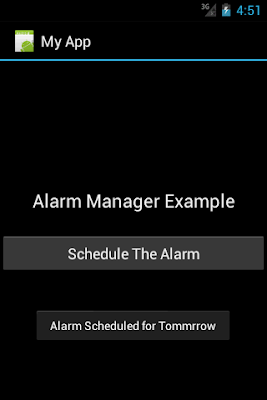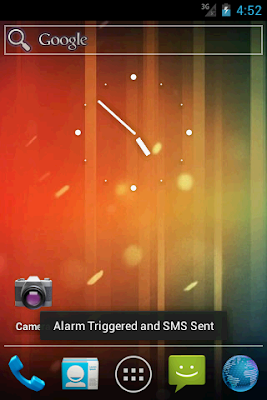Android Alarm Manager
AlarmManager
Many a times we want some task to be performed at some later time in future.
For Example: In SMS Scheduler we want a SMS to be send at some later time, or Task Reminder in which we want to be reminded about a task at a particular time, to implement all these things we use AlramManager class.
AlarmManager class provides access to the system alarm services. These allow you to schedule your application to be run at some point in the future. When an alarm goes off, the
Intent that had been registered for it is broadcast by the system, automatically starting the target application if it is not already running. Registered alarms are retained while the device is asleep (and can optionally wake the device up if they go off during that time), but will be cleared if it is turned off and rebooted. Context.startService(), it is possible that the phone will sleep before the requested service is launched. To prevent this, your BroadcastReceiver and Service will need to implement a separate wake lock policy to ensure that the phone continues running until the service becomes available.Android AlarmManager Example
In the example I will schedule an alarm to send SMS at a particular time in future.We have two classes
1: MainAcitvity: in this class, we will schedule the alarm to be triggered at particular time .
2: AlarmReciever: when the alarm triggers at scheduled time , this class will receive the alarm, and send the SMS.
AlarmReciever class extends BroadcastReceiver and overrides onRecieve() method. inside onReceive() you can start an activity or service depending on your need like you can start an activity to vibrate phone or to ring the phone
Permission Required
we need <uses-permission android:name="com.android.alarm.permission.SET_ALARM"/> permission to use the AlarmManger in our application, so do not forget to declare the permission in manifest file
AndroidManifest file
<?xml version="1.0" encoding="utf-8"?><manifest xmlns:android="http://schemas.android.com/apk/res/android"
package="com.learnandroideasily.blogspot"
android:versionCode="1"
android:versionName="1.0" >
<uses-sdk android:minSdkVersion="8"
android:targetSdkVersion="17" />
<!-- permission required to use Alarm Manager -->
<uses-permission android:name="com.android.alarm.permission.SET_ALARM"/>
<!-- permission required to Send SMS -->
<uses-permission android:name="android.permission.SEND_SMS"/>
<application
android:icon="@drawable/ic_launcher"
android:label="Demo App" >
<activity
android:name=".MainActivity"
android:label="Demo App" >
<intent-filter>
<action android:name="android.intent.action.MAIN" />
<category android:name="android.intent.category.LAUNCHER" />
</intent-filter>
</activity>
<!-- Register the Alarm Receiver -->
<receiver android:name=".AlarmReciever"/>
</application>
</manifest>
main.xml
<LinearLayout
android:layout_width="fill_parent"
android:layout_height="fill_parent"
android:orientation="vertical"
android:gravity="center_vertical"
xmlns:android="http://schemas.android.com/apk/res/android">
<TextView
android:id="@+id/textView1"
android:gravity="center_horizontal"
android:layout_width="fill_parent"
android:layout_height="wrap_content"
android:text="Alarm Manager Example"
android:textAppearance="?android:attr/textAppearanceLarge" />
<Button
android:id="@+id/button1"
android:layout_marginTop="25dp"
android:layout_width="fill_parent"
android:layout_height="wrap_content"
android:text="Schedule The Alarm"
android:onClick="scheduleAlarm"/>
</LinearLayout>
MainActivity.java
public class MainActivity extends Activity
{
@Override
public void onCreate(Bundle savedInstanceState)
{
super.onCreate(savedInstanceState);
setContentView(R.layout.main);
}
public void scheduleAlarm(View V)
{
// time at which alarm will be scheduled here alarm is scheduled at 1 day from current time,
// we fetch the current time in milliseconds and added 1 day time
// i.e. 24*60*60*1000= 86,400,000 milliseconds in a day
Long time = new GregorianCalendar().getTimeInMillis()+24*60*60*1000;
// create an Intent and set the class which will execute when Alarm triggers, here we have
// given AlarmReciever in the Intent, the onRecieve() method of this class will execute when
// alarm triggers and
//we will write the code to send SMS inside onRecieve() method pf Alarmreciever class
Intent intentAlarm = new Intent(this, AlarmReciever.class);
// create the object
AlarmManager alarmManager = (AlarmManager) getSystemService(Context.ALARM_SERVICE);
//set the alarm for particular time
alarmManager.set(AlarmManager.RTC_WAKEUP,time, PendingIntent.getBroadcast(this,1, intentAlarm, PendingIntent.FLAG_UPDATE_CURRENT));
Toast.makeText(this, "Alarm Scheduled for Tommrrow", Toast.LENGTH_LONG).show();
}
}
AlarmReciever.java
public class AlarmReciever extends BroadcastReceiver
{
@Override
public void onReceive(Context context, Intent intent)
{
// TODO Auto-generated method stub
// here you can start an activity or service depending on your need
// for ex you can start an activity to vibrate phone or to ring the phone
String phoneNumberReciver="9718202185";// phone number to which SMS to be send
String message="Hi I will be there later, See You soon";// message to send
SmsManager sms = SmsManager.getDefault();
sms.sendTextMessage(phoneNumberReciver, null, message, null, null);
// Show the toast like in above screen shot
Toast.makeText(context, "Alarm Triggered and SMS Sent", Toast.LENGTH_LONG).show();
}
}








ReplyDeleteVIEW MY TUTORIAL